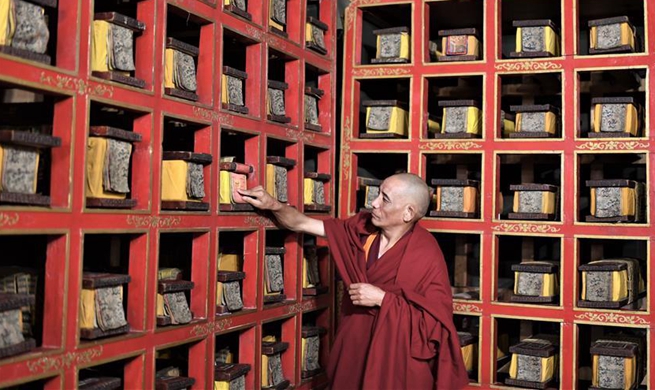by Julia Pierrepont III
LOS ANGELES, Feb. 25 (Xinhua) -- Hollywood celebrated its 91st annual award celebration Sunday night. Despite the usual kvetching and complaining, the Oscars are undeniably evolving.
Critics will have a hard time overlooking the fact that Hollywood's most prestigious award ceremony, derisively referred to just a couple of years ago as #OscarsSoWhite, did an about-face this year, granting 17 out of 24 wins to minority artists or films exploring racial issues.
"Bohemian Rhapsody," a film about an openly gay rock star, sung its way to the most wins, with four in total, while "Green Book," "Black Panther" and "Roma" claimed three awards each.
Best Picture, the Oscars' highest honor, went to "Green Book," a story that examines race relations in the racially charged 1960s through the eyes of a bigoted white bouncer and the highly educated, world-class black pianist he chauffeurs around the South.
"Black Panther," a Marvel action film with a virtually all-black cast, became the first studio superhero pic to be nominated for a Best Picture Award. It ended up snapping up Best Original Score, Best Production Design and Best Costume Design, making Hannah Beachler the first black female production designer to win in this category and Ruth E. Carter the first black costume designer to win for Costumes.
The extraordinarily talented Alfonso Cuaron, who hails from Mexico, walked away with three Oscars for "Roma," his tone poem for the Mexico of his youth -- one for Best Director, Hollywood's second highest honor, a second for Best Foreign Language Film, and a third for Best Cinematography.
"Roma is not what you would call Oscar bait, you know? ... Most importantly, audiences around the world and the Academy are embracing a character who is a domestic worker from an indigenous background," said Cuaron feelingly. "There is so much talk of diversity, and some progress has been made, but definitely the Hispanic Americans, and specifically Chicanos, are really, really badly represented still."
Three of the four top honors for acting went to actors of color: Rami Malek became the first Egyptian American to take the Best Actor statue for "Bohemian Rhapsody." Regina King nabbed Best Supporting Actress for "If Beale Street Could Talk" and Mahershala Ali won the Best Supporting Actor award for "Green Book." Ali is also the first Muslim actor to win an Oscar.
When was the last time three of the top actor awards went to people of color? Answer: Never.
"When Hattie McDaniel won, she didn't win just because black people voted for her, she won because she gave an amazing performance," said King after her win. "Especially back then, the Academy was not as reflective as it is now. We're still trying to get more reflective, we're still trying to get there."
McDaniel is best known for her role as "Mammy" in 1939's "Gone with the Wind," for which she won the Oscar for Best Supporting Actress, the first Oscar won by an African American entertainer.
Next up, from the writing team of "BlackKklansman," Spike Lee is only the third African American to win the Best Adapted Screenplay Award since John Ridley in 2013 for "Twelve Years a Slave" and Geoffrey Fletcher in 2009 for "Precious."
"Without April Reign, #OscarsSoWhite, and the former president of the Academy of Motion Picture Arts and Sciences, Cheryl Boone Isaacs, I wouldn't be here tonight. They opened up the Academy to make the Academy look more like America," said Lee backstage after his Oscar win.
Jimmy Chen, a Chinese American, won Best Documentary Feature for "Free Solo," while Domee Shi, a Chinese immigrant to Canada, won Best Animated Short for writing and directing Pixar's "Bao."
"One of the great things about being able to make 'Bao' is I got to do a lot more research and really dive into my Chinese heritage. I kind of took it for granted," Shi told Xinhua after winning her award.
"I also learned how universal the theme of food bringing families together is," she added.
Best Animated Feature was snagged by "Spider-man: Into the Spider-Verse," the first win in this category by an African American director, Peter Ramsey.
Best Documentary Short went to "Period. End of Sentence," a feminist doc about menstruation in India. The director of the film, Rayka Zehtabchi, became the first Iranian American woman to win an Oscar.

















